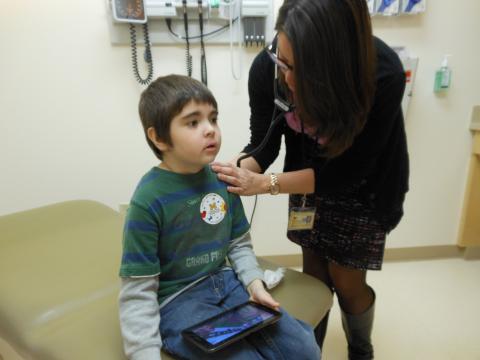
The Immuno-Hematology Comprehensive Program medical student elective in immuno-hematology is primarily an outpatient clinical patient care elective supplemented by key inpatient and core curriculum activities in the areas of immunodeficiency, lymphoproliferative disorders, neutrophil disorders and bone marrow failure syndromes. Students will have the opportunity to engage in direct patient care through a unique multi-disciplinary care module, involving Pediatric Hematology/Oncology, Pediatric Infectious Disease, Medical Genetics, Allergy/Immunology and Pediatric Bone Marrow Transplant, for rare and complex disease. Students will also be offered the opportunity to participate in other related outpatient clinics, be an active member of patient-case conferences, participate in procedures (e.g. bone marrow aspirate/biopsy, bone marrow harvest) and round on the inpatient Pediatric Bone Marrow Transplant service and/or inpatient Pediatric Infectious Disease consult service.
In addition to the clinical component of the elective, students will be expected to participate in a mentored academic activity such as a case report/series, poster presentation, formal didactic presentation or development of a relevant clinical practice guideline tailored to their interests. Student will be strongly encouraged to submit their academic project as an abstract to the annual Immuno-Hematology Symposium for consideration of a poster/oral presentation. Following the completion of the elective:

1. Students should be able to interpret standard immunologic/hematology assays, e.g. complete blood count and differential, quantitative immunoglobulins, T- and B-cell subsets, TREC enumeration as well as functional assays, and describe anticipated deficiencies in the immune system based on laboratory testing.
2. Students should be able to describe the evaluation of an infant with an abnormal TREC assay newborn screen.
3. Students should be able to identify risk factors for opportunistic infections and articulate strategies for infectious prophylaxis/prevention. Students should be able to recognize the clinical presentation of opportunistic infections in immunocompromised hosts and their implications for defects in immunologic processes.
4. Students should be able to articulate the definition of aplastic anemia, describe the initial evaluation and management of patients with aplastic anemia and recognize features associated with bone marrow failure syndromes. Students should specifically recognize features associated with paroxysmal nocturnal hemoglobinuria (PNH), Diamond-Blackfan anemia, congenital amegakaryocytic thrombocytopenia, Fanconi anemia and dyskeratosis congenita (DKC).
5. Students should be able to distinguish malignant lymphoproliferation from non-malignant lymphoproliferation and understand the clinical features/laboratory testing that is useful in discriminating the two entities. Students should specifically recognize features associated with hemophagocytic lymphohistiocytosis (HLH), x-linked lymphoproliferative disease (XLP), and autoimmune lymphoproliferative syndrome (ALPS).
6. Students should be able to articulate the definition of neutropenia, describe the evaluation of patients with neutropenia (including key elements of the history, physical exam and laboratory evaluation), and know the clinical features associated with specific neutropenia-related syndromes, e.g. autoimmune neutropenia of infancy, severe congenital neutropenia, cyclic neutropenia, Shwachman-Diamond syndromes and idiopathic neutropenia.
7. Students should be able to list the key factors to consider for the selection on bone marrow transplant donors, describe the differences between full intensity and reduced-intensity transplant conditioning regimens, recognize the risk of alkylating agents in certain immuno-hematologic disorders, and describe the anticipated infectious complications of bone marrow transplant.
8. Students should be able to perform a formal evaluation for inheritable causes of immune deficiencies, lymphoproliferative diseases, bone marrow failure, and neutropenia. This evaluation includes collecting a thorough family history and formulating appropriate hypotheses regarding inheritance patterns. Students should also be able to recognize “common” inherited disorders in immunologic and hematologic diseases.
The 4 week elective is open to both University of Michigan medical school and outside students. Non-University of Michigan students are required to complete a VSAS application. For questions regarding the elective, please contact Kelly Walkovich, MD, at [email protected].




